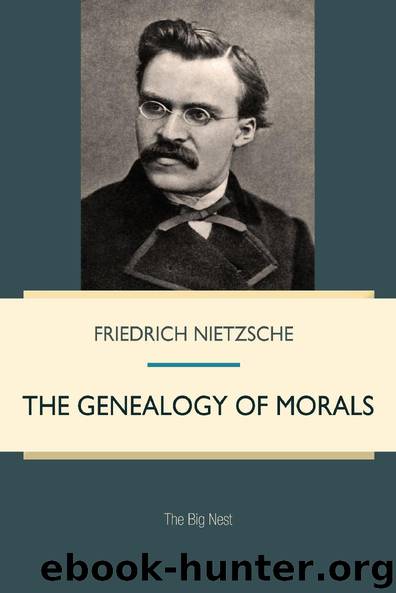The Genealogy of Morals by Friedrich Nietzsche

Author:Friedrich Nietzsche [Nietzsche, Friedrich]
Language: eng
Format: epub
Tags: ebook, novel, book, bestseller, top10, interactive media, urban romantics
Publisher: The Big Nest
Published: 2019-09-23T00:00:00+00:00
THIRD ESSAY.
WHAT IS THE MEANING OF ASCETIC IDEALS?
'Careless, mocking, forceful—so does wisdom wish us: she is a woman, and never loves any one but a warrior.'
Thus Spake Zarathustra.
1.
What is the meaning of ascetic ideals? In artists, nothing, or too much; in philosophers and scholars, a kind of 'flair' and instinct for the conditions most favourable to advanced intellectualism; in women, at best an additional seductive fascination, a little morbidezza on a fine piece of flesh, the angelhood of a fat, pretty animal; in physiological failures and whiners (in the majority of mortals), an attempt to pose as 'too good' for this world, a holy form of debauchery, their chief weapon in the battle with lingering pain and ennui; in priests, the actual priestly faith, their best engine of power, and also the supreme authority for power; in saints, finally a pretext for hibernation, their novissima gloriæ cupido, their peace in nothingness ('God'), their form of madness.
But in the very fact that the ascetic ideal has meant so much to man, lies expressed the fundamental feature of man›s will, his horror vacui: he needs a goal—and he will sooner will nothingness than not will at all.—Am I not understood?—Have I not been understood?—'Certainly not, sir?'—Well, let us begin at the beginning.
2.
What is the meaning of ascetic ideals? Or, to take an individual case in regard to which I have often been consulted, what is the meaning, for example, of an artist like Richard Wagner paying homage to chastity in his old age? He had always done so, of course, in a certain sense, but it was not till quite the end, that he did so in an ascetic sense. What is the meaning of this 'change of attitude,' this radical revolution in his attitude—for that was what it was? Wagner veered thereby straight round into his own opposite. What is the meaning of an artist veering round into his own opposite? At this point (granted that we do not mind stopping a little over this question), we immediately call to mind the best, strongest, gayest, and boldest period, that there perhaps ever was in Wagner›s life: that was the period, when he was genuinely and deeply occupied with the idea of 'Luther›s Wedding.' Who knows what chance is responsible for our now having the Meistersingers instead of this wedding music? And how much in the latter is perhaps just an echo of the former? But there is no doubt but that the theme would have dealt with the praise of chastity. And certainly it would also have dealt with the praise of sensuality, and even so, it would seem quite in order, and even so, it would have been equally Wagnerian. For there is no necessary antithesis between chastity and sensuality: every good marriage, every authentic heart-felt love transcends this antithesis. Wagner would, it seems to me, have done well to have brought this pleasing reality home once again to his Germans, by means of a bold and graceful 'Luther Comedy,'
Download
This site does not store any files on its server. We only index and link to content provided by other sites. Please contact the content providers to delete copyright contents if any and email us, we'll remove relevant links or contents immediately.
The remains of the day by Kazuo Ishiguro(7572)
Tools of Titans by Timothy Ferriss(6963)
The Black Swan by Nassim Nicholas Taleb(6202)
Inner Engineering: A Yogi's Guide to Joy by Sadhguru(5906)
Giovanni's Room by James Baldwin(5892)
The Way of Zen by Alan W. Watts(5808)
The Six Wives Of Henry VIII (WOMEN IN HISTORY) by Fraser Antonia(4797)
The Power of Now: A Guide to Spiritual Enlightenment by Eckhart Tolle(4766)
Astrophysics for People in a Hurry by Neil DeGrasse Tyson(4627)
Asking the Right Questions: A Guide to Critical Thinking by M. Neil Browne & Stuart M. Keeley(4597)
12 Rules for Life by Jordan B. Peterson(3744)
The Ethical Slut by Janet W. Hardy(3509)
Skin in the Game by Nassim Nicholas Taleb(3476)
Housekeeping by Marilynne Robinson(3418)
The Art of Happiness by The Dalai Lama(3390)
Double Down (Diary of a Wimpy Kid Book 11) by Jeff Kinney(3284)
Skin in the Game: Hidden Asymmetries in Daily Life by Nassim Nicholas Taleb(3271)
Walking by Henry David Thoreau(3236)
12 Rules for Life: An Antidote to Chaos by Jordan B. Peterson(3209)
